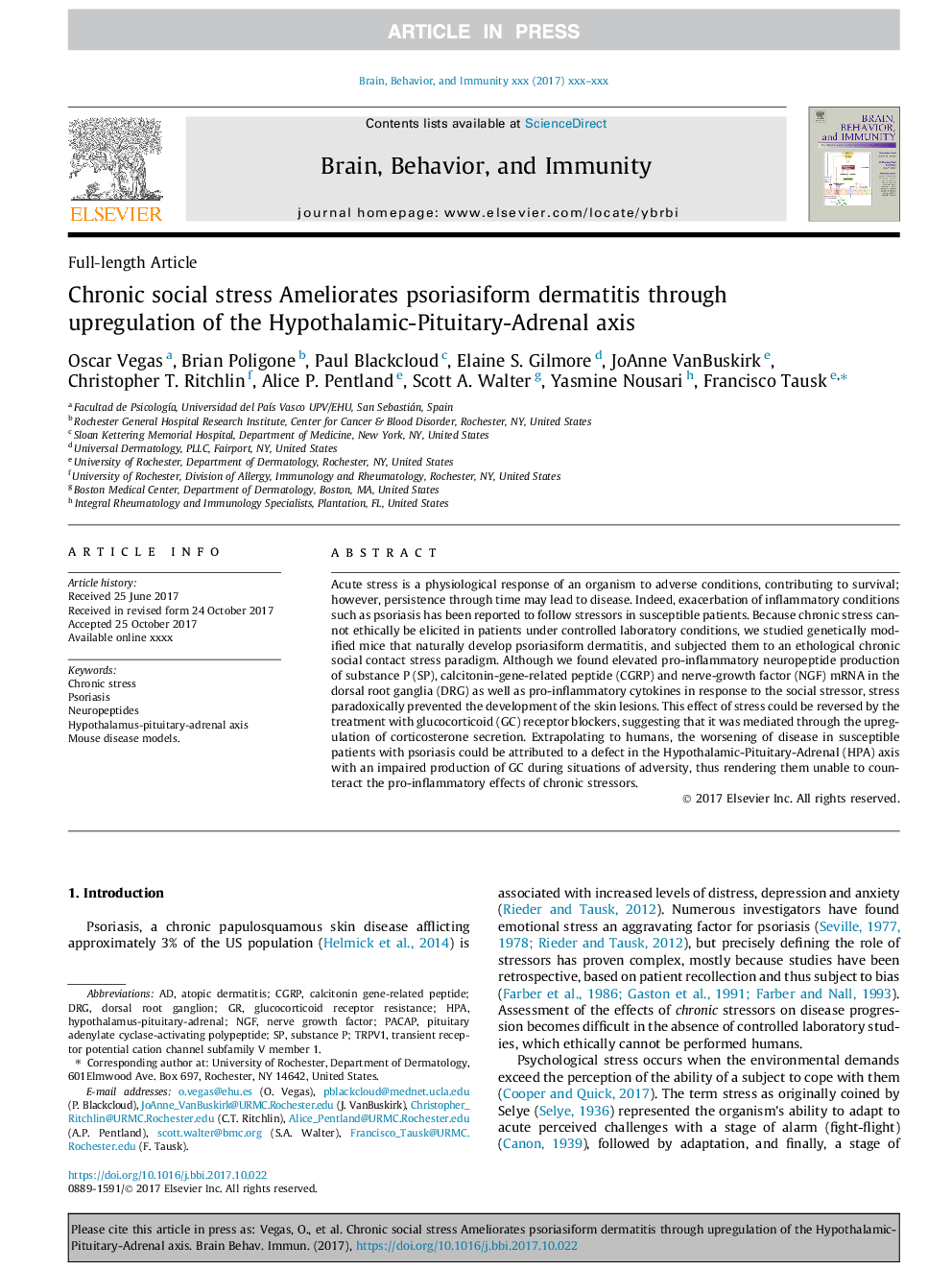| کد مقاله | کد نشریه | سال انتشار | مقاله انگلیسی | نسخه تمام متن |
|---|---|---|---|---|
| 7279650 | 1473898 | 2018 | 10 صفحه PDF | دانلود رایگان |
عنوان انگلیسی مقاله ISI
Chronic social stress Ameliorates psoriasiform dermatitis through upregulation of the Hypothalamic-Pituitary-Adrenal axis
ترجمه فارسی عنوان
استرس مزمن اجتماعی باعث کاهش درماتیت پسوریازیس فرم از طریق ارتقاء محور هیپوتالاموس-هیپوفیز-آدرنال
دانلود مقاله + سفارش ترجمه
دانلود مقاله ISI انگلیسی
رایگان برای ایرانیان
کلمات کلیدی
TRPV1DRGPACAPCGRPNGFdorsal root ganglion - گانگلیون ریشه پشتیChronic stress - استرس مزمنAtopic dermatitis - درماتیت آتوپیکnerve growth factor - فاکتور رشد عصبSubstance P - ماده PHypothalamus-pituitary-adrenal axis - محور هیپوتالاموس-هیپوفیز-آدرنالHPA - میلی بار یا هکتوپاسکالNeuropeptides - نوروپپتیدهاhypothalamus-pituitary-adrenal - هیپوتالاموس-هیپوفیز-آدرنالPsoriasis - پسوریازیسpituitary adenylate cyclase-activating polypeptide - پلیپپتید فعال آدنیلات سیکلاس هیپوفیزcalcitonin gene-related peptide - پپتید مرتبط با ژن کلسی تونینtransient receptor potential cation channel subfamily V member 1 - کانال زیر کانال کانتینت گیرنده گذرا V عضو 1
موضوعات مرتبط
علوم زیستی و بیوفناوری
ایمنی شناسی و میکروب شناسی
ایمونولوژی
چکیده انگلیسی
Acute stress is a physiological response of an organism to adverse conditions, contributing to survival; however, persistence through time may lead to disease. Indeed, exacerbation of inflammatory conditions such as psoriasis has been reported to follow stressors in susceptible patients. Because chronic stress cannot ethically be elicited in patients under controlled laboratory conditions, we studied genetically modified mice that naturally develop psoriasiform dermatitis, and subjected them to an ethological chronic social contact stress paradigm. Although we found elevated pro-inflammatory neuropeptide production of substance P (SP), calcitonin-gene-related peptide (CGRP) and nerve-growth factor (NGF) mRNA in the dorsal root ganglia (DRG) as well as pro-inflammatory cytokines in response to the social stressor, stress paradoxically prevented the development of the skin lesions. This effect of stress could be reversed by the treatment with glucocorticoid (GC) receptor blockers, suggesting that it was mediated through the upregulation of corticosterone secretion. Extrapolating to humans, the worsening of disease in susceptible patients with psoriasis could be attributed to a defect in the Hypothalamic-Pituitary-Adrenal (HPA) axis with an impaired production of GC during situations of adversity, thus rendering them unable to counteract the pro-inflammatory effects of chronic stressors.
ناشر
Database: Elsevier - ScienceDirect (ساینس دایرکت)
Journal: Brain, Behavior, and Immunity - Volume 68, February 2018, Pages 238-247
Journal: Brain, Behavior, and Immunity - Volume 68, February 2018, Pages 238-247
نویسندگان
Oscar Vegas, Brian Poligone, Paul Blackcloud, Elaine S. Gilmore, JoAnne VanBuskirk, Christopher T. Ritchlin, Alice P. Pentland, Scott A. Walter, Yasmine Nousari, Francisco Tausk,
